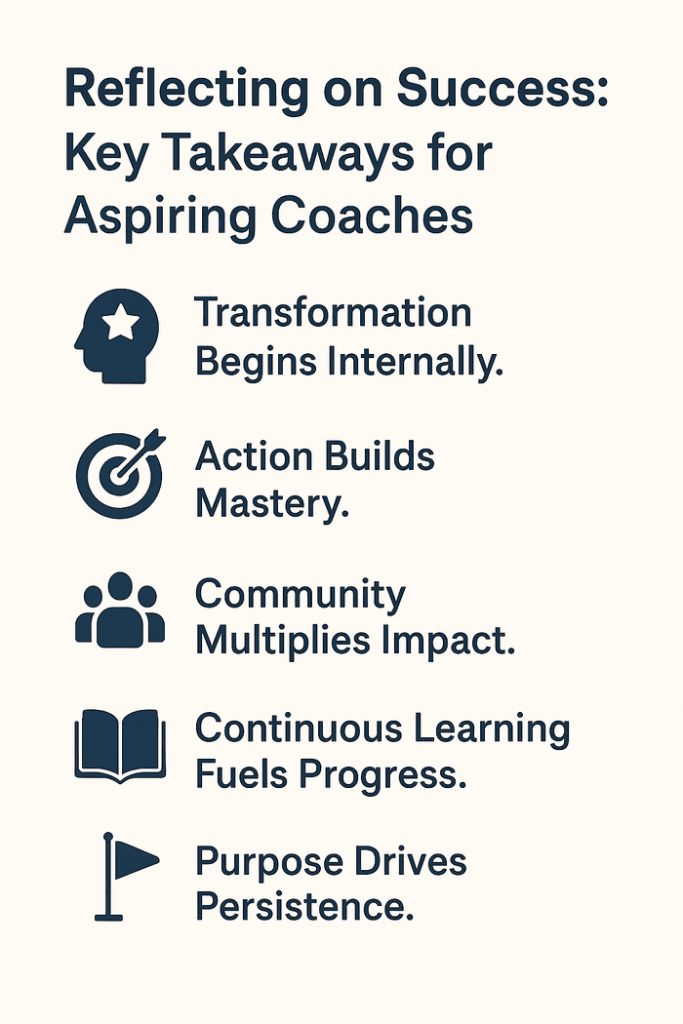
When prospective coaches research training options, cost is often the first number they look for. A quick internet search produces...
Stories have the power to inspire action. When prospective coaches ask whether completing The Art & Science of Coaching or other Erickson programmes will truly change their lives, there’s no better answer than the experiences of those who have walked the path. Erickson Coaching International has over 55,000 alumni across more than 130 countries, and Erickson India’s journey includes introducing solution‑focused coaching to professionals since 2013. In this article, we explore three compelling success stories of Indian alumni who transformed classroom learning into flourishing coaching practices. Through their journeys, you’ll discover practical strategies, mindset shifts and lessons for your own transition from student to professional coach.
Erickson Coaching India brings four decades of global coaching excellence to the Indian market. Founded in Vancouver in 1980 by psychologist Dr Marilyn Atkinson, Erickson pioneered solution‑focused coaching that emphasises the resourcefulness of every individual. In India, the programme launched in 2013, and since then it has trained thousands of leaders, entrepreneurs and change agents. The Art & Science of Coaching’s core principles—future & solutions focus, holistic & systemic thinking, resource activation and action & accountability—serve as the backbone for each success story here. These principles not only equip graduates with powerful skills but also instil a mindset of possibility and continuous improvement.
Ajay (name changed for privacy) held a senior leadership role at a multinational corporation in Mumbai. A brilliant strategist, Ajay often felt unseen and unheard in board meetings. Despite his expertise, he lacked confidence when presenting ideas and feared public speaking. He recognised that his inability to articulate his vision was limiting his career. Encouraged by his HR department, Ajay enrolled in The Art & Science of Coaching Level 1. He hoped that coaching skills would improve his communication and help him lead more effectively.
During the programme, Ajay learned about solution‑focused questioning, perceptual positions and the importance of activating clients’ resources. He applied these principles to himself, identifying a limiting belief: “I’m not charismatic enough to inspire others.” Through exercises and peer coaching, he reframed this belief to “My authenticity and preparation are my charisma.” He practised the anchoring technique—associating a confident memory with a physical gesture. He also participated in public speaking practice groups within the Erickson alumni community.
Ajay’s transformation was profound. In board meetings, he began speaking up with clarity and conviction. Within six months, he led a strategic presentation that resulted in the approval of a new product line. His colleagues noticed the change: he was more approachable, and his listening skills improved. Ajay decided to pursue Level 2 training and accumulate coaching hours toward the ACC credential. He then blended coaching with his leadership role, offering peer coaching sessions. This not only enhanced team performance but also positioned him as a culture change agent. Eventually, he launched a side business offering executive coaching to mid‑career managers. His clients appreciated his structured approach and empathy—skills he credited to Erickson’s methodology. Ajay often cites the testimonial of a client who said coaching “made me realise that the answers to my problems are within me” and that “my productivity increased and confidence sky‑rocketed”. These words remind him of his own journey.
Meghana (also a pseudonym) worked as a vice president at a leading bank in Delhi. Though successful, she felt stuck in her career and lacked clarity about her long‑term direction. Public speaking terrified her, and she hesitated to share ideas during team meetings. She learned about Erickson’s programme at a leadership development seminar and decided to enrol in the Art & Science of Coaching. Her goal was to develop communication skills and explore whether coaching could become a second career.
Through Level 1 and Level 2 modules, Meghana mastered the GROW model, learned to ask powerful questions, and practised active listening. She discovered that coaching was not about giving advice but about helping clients unlock their own insights. The class environment encouraged experimentation and vulnerability. Meghana often presented case studies and sought feedback from peers. She noticed patterns of self‑criticism and perfectionism. With the support of her cohort, she reframed her beliefs and integrated positive affirmations into her routine. A key breakthrough occurred during a practice session where she coached a colleague through a complex negotiation scenario. She realised she was skilled at drawing out others’ strengths and helping them craft clear action plans.
As Meghana applied coaching skills at work, her confidence and communication improved dramatically. She began facilitating meetings with ease, using solution‑focused questions to guide discussions. Her managers noticed her enhanced leadership presence and offered her a promotion. Inspired, Meghana completed her mentor coaching hours and obtained the ACC credential. She then started a part‑time coaching practice focusing on communication skills for women leaders. Her first clients were colleagues who had witnessed her transformation. Feedback was overwhelmingly positive: one client remarked that Meghana had “a structured way of looking at your issue and uncovering challenges you didn’t realise you had”. Meghana now runs monthly workshops on executive communication and is pursuing the PCC credential. She credits Erickson’s resource activation principle for helping her trust that clients have the answers within them.
Sapna, a country manager for an events management company in Bangalore, was juggling intense deadlines, travel and the pressure of delivering flawless events. Chronic stress led to insomnia and constant fatigue. Realising that her well‑being was suffering, she decided to invest in her growth. A colleague recommended the Art & Science of Coaching, emphasising its focus on personal transformation. Sapna enrolled with the hope of developing tools to manage stress and perhaps pivot to a career that aligned more with her values.
Through Erickson’s systemic approach, Sapna learned to view her stress as part of a larger ecosystem—including organisational expectations, personal boundaries and cultural norms. She practised submodality shifts to reduce the intensity of stressful memories and adopted daily mindfulness practices. In peer coaching sessions, she explored the belief that “working harder equals worthiness.” Her coach helped her rewrite this narrative to “my worth is inherent, and rest fuels my effectiveness.” She also learned resource activation techniques to help others see their strengths. During the programme, Sapna volunteered to co‑facilitate a wellness workshop for her cohort, combining coaching with breathing exercises.
Sapna’s health improved as she integrated mindfulness, boundaries and self‑care. She used her newfound confidence to advocate for flexible schedules within her company and introduced stress‑management sessions for her team. The initiative reduced burnout and improved morale. Encouraged by colleagues, she pursued Level 2 and launched a coaching practice focused on wellness and resilience. Sapna’s clients include corporate executives struggling with work‑life balance and stay‑at‑home parents seeking purpose. Testimonials mirror her own transformation: one client shared that coaching “helped me lay out a roadmap to enhance my health” and left them “physically and emotionally rejuvenated”. Sapna also runs pro‑bono workshops for non‑profit organisations, combining coaching with yoga and meditation.
All three alumni shifted from problem‑centric to solution‑focused thinking. Instead of ruminating on past failures, they asked, “What do I want to create?” This mindset empowered them to envision desired outcomes and craft actionable steps. By focusing on future possibilities, they experienced greater motivation and resilience.
Each story highlights the value of Erickson’s global network. Peer coaching sessions provided practice and feedback, while alumni connections led to partnerships and referrals. The community fostered accountability—participants felt supported yet challenged. For Indian professionals, joining a cohort of diverse backgrounds expanded cultural perspectives and built lifelong friendships.
Whether it was Ajay’s fear of public speaking, Meghana’s self‑criticism or Sapna’s belief that worth comes from overwork, each coach confronted limiting beliefs. Techniques like anchoring, reframing and positive affirmations enabled them to replace these beliefs with empowering narratives. Recognising that the answers lie within was a central lesson.
None of the alumni immediately abandoned their careers. They integrated coaching skills into leadership, banking and event management roles before starting independent practices. This integration allowed them to test their skills, build confidence and demonstrate value. It also brought immediate ROI: improved team performance, promotions and reduced stress.
The journey didn’t end with Level 2. All three pursued mentor coaching, ACC credentials and advanced programmes. Continuous learning kept them growing and increased their credibility. It also ensured they met ethical standards and stayed abreast of industry innovations.
Drawing from these stories, here is a roadmap to transition smoothly from the classroom to a thriving coaching practice.
Feeling like a fraud is common among new coaches. Ajay admitted to doubting his ability to add value to senior leaders. Over time, witnessing client transformations and receiving positive feedback diminished his imposter syndrome. Journaling, supervision and support from peers can help you challenge self‑doubt.
Many coaches struggle with self‑promotion. Meghana initially hesitated to market her services. She overcame this by viewing marketing as service—sharing useful content and inviting those who resonate to engage. Leveraging testimonials and statistics (e.g., coaching clients can expect a median 7× ROI on their investment) legitimises your services.
Sapna’s journey illustrates the importance of self‑care. New coaches often over‑extend themselves, especially when building a practice alongside a full‑time job. Establish boundaries, schedule rest and integrate wellness practices. Remember that modelling healthy behaviour enhances your credibility.
Handling finances, legalities and client administration can be daunting. Seek professional advice, use templates for contracts and invoices, and gradually systematise your processes. Investing in a virtual assistant or accounting software allows you to focus on coaching.
Erickson’s global community is a powerhouse. Alumni groups in India organise regular peer coaching sessions, mastermind circles and social events. Many graduates collaborate to co‑host workshops, share marketing strategies and refer clients. Staying engaged with this network multiplies your visibility and support. International connections open doors to cross‑border coaching opportunities, which is especially valuable as remote work becomes the norm.
Virtual coaching has become mainstream. Digital platforms allow coaches to work with clients across time zones. Learning to deliver impactful sessions through video calls, using online whiteboards and asynchronous communication creates scalability. Coaches who master digital facilitation can serve global markets, including Indian professionals abroad.
New niches are emerging as the coaching field expands. For example:
By identifying nascent needs, new coaches can differentiate themselves and capture untapped markets.
As awareness about mental health grows in India, coaching and therapy often intersect. Coaches trained to recognise when a client needs therapeutic support will build trust and maintain ethical boundaries. Collaborations with mental health professionals allow for integrated care. Programmes like Erickson’s emphasise holistic well‑being, preparing graduates to hold space for complex emotions while keeping coaching within its scope.
Companies increasingly recognise that coaching drives performance and innovation. Studies show that organisations with strong coaching cultures report higher revenue and employee engagement. Indian corporations are following suit, integrating coaching programmes into leadership development and change initiatives. New coaches can tap into this demand by partnering with HR departments or consulting firms.
Rohan, a mid‑level manager at a bank, felt unfulfilled despite steady promotions. He joined Erickson’s programme seeking clarity. During training, he discovered a passion for helping colleagues set career goals. He started offering lunch‑and‑learn sessions on career planning using solution‑focused techniques. After earning his ACC credential, Rohan left the bank and launched a career coaching practice. Within two years, he built a client base of 40 professionals, earning more than his banking salary. He attributes his success to consistent application of coaching models and leveraging alumni referrals.
Priya, a high school teacher in Hyderabad, wanted to help students navigate stress and build confidence. She completed The Art & Science of Coaching during school holidays. Priya integrated coaching conversations into her classes, using powerful questions to engage students. Inspired by their progress, she created an after‑school programme offering group coaching for teens. Parents noticed improvements in their children’s communication and emotional regulation. Priya eventually transitioned to full‑time coaching, partnering with schools across Telangana. Her story illustrates how coaching skills extend beyond corporate boardrooms into education.
Vikram, a software engineer from Pune, was passionate about agile methodologies. After realising that technical expertise alone wasn’t sufficient to lead teams, he joined Erickson’s programme. He learned about systems thinking and resource activation, which complemented agile principles. Vikram introduced solution‑focused stand‑ups, encouraging teammates to articulate wins and next steps. Team morale improved, and projects were delivered ahead of schedule. With the support of his employer, he enrolled in Erickson’s Team Coaching Certification. Today, Vikram is an internal agile coach, leading organisational transformation initiatives and training other engineers in coaching skills.

These three stories—and the additional composites—demonstrate that moving from classroom to coaching practice is not only possible but profoundly rewarding. Each journey is unique, yet they share common threads: commitment to growth, application of Erickson’s solution‑focused methodology, engagement with a supportive community and a willingness to take consistent action. The ROI manifests in promotions, thriving businesses, improved well‑being and positive social impact. As the coaching industry continues to expand, especially in India, there has never been a better time to turn your training into a transformative career. By learning from those who have gone before and forging your own path, you can create a success story that inspires others and contributes to the collective mission of raising consciousness—one conversation at a time.
Success stories inspire us, but they are just the beginning. After completing The Art & Science of Coaching, graduates must translate what they have learned into a sustainable business or practice. The three alumni above all invested time in the unglamorous—but essential—business foundations: clarifying their niche, building a personal brand and creating structures for sales and marketing.
Start by identifying the specific problems you solve and the audience you most enjoy serving. For Shalini it was corporate leaders dealing with burnout; for Priya it was teenagers facing exam stress; for Vikram it was software teams struggling with communication and agility. When you are clear about your niche, you can craft marketing messages that speak directly to your clients’ pain points and aspirations. Develop a succinct “elevator pitch” that communicates who you help, how you help them and the results they can expect.
Next, focus on building a professional brand. Graduates often underestimate the importance of an online presence. A simple website showcasing your credentials, testimonials and service packages legitimises your practice. Consistent blogging or social media content not only demonstrates your expertise but also improves search engine visibility, making it easier for clients to find you. Many Erickson alumni write about topics like leadership resilience, time management and mindfulness, leveraging their training to deliver actionable insights.
Pricing and packaging your services is another critical step. Rather than charging by the hour, many successful coaches offer programmes that include a fixed number of sessions, assessments and email support. This approach clarifies expectations and helps clients commit to a process rather than a one‑off conversation. Consider offering free discovery calls to build rapport and demonstrate value before discussing fees.
Creating systems for referrals and word‑of‑mouth growth is also important. Encourage satisfied clients to share testimonials and refer friends or colleagues. Participation in alumni communities or professional coaching networks provides opportunities for joint webinars, podcasts and cross‑referrals. As your practice grows, you might partner with organisations to deliver workshops or group programmes, creating diversified income streams and reaching more people.
Finally, treat your coaching practice like any other business. Track your expenses and revenue, set quarterly goals, invest in marketing and professional development, and periodically review what is and isn’t working. Building a sustainable coaching career requires the same strategic thinking and discipline you encourage in your clients.
The coaching landscape in India is evolving rapidly. According to industry reports, the global coaching market is expected to grow to US$21.94 billion by the end of the decade. While India comprises a fraction of this figure, it is one of the fastest‑growing segments. Several trends are shaping the next decade:
Indian organisations have historically invested in technical training. However, with the increasing complexity of workplaces and the mental health impact of events like the COVID‑19 pandemic, there is a growing appetite for leadership development, emotional intelligence and wellbeing initiatives. Many corporations now view coaching not as a luxury but as a strategic necessity to develop adaptive leaders and resilient teams. Government departments, educational institutions and start‑ups are also exploring coaching programmes to foster innovation and accountability.
Technology has broadened access to high‑quality coaching. Online group sessions, learning management systems and AI‑driven assessment tools allow coaches to serve clients across geographies. For Erickson alumni, this means you can reach clients in tier‑2 cities or overseas without relocating. Hybrid models—combining asynchronous learning modules with live coaching—are particularly effective because they provide content flexibility while preserving the human connection. Many coaches use video conferencing, collaborative platforms and secure digital notebooks to enhance accountability and engagement.
Clients today demand proof of efficacy. Solution‑focused coaching—already grounded in systems theory and humanistic psychology—is increasingly integrating insights from neuroscience. This aligns well with Erickson’s emphasis on resource activation and brain‑based learning. Coaches who understand how neuroplasticity works can design interventions that reshape thought patterns and behaviours more effectively. Expect to see more coaches collaborating with psychologists and neuroscientists to offer programmes addressing stress, burnout and habit change.
As the profession matures, there is room for specialists. In India you will find coaches focusing on expatriate transitions, return‑to‑work mothers, youth employability, financial wellbeing and even spirituality. Specialist credentials and advanced training—such as team coaching certifications or health and wellness coaching diplomas—open doors to new markets. Erickson India’s alumni network is already expanding its programme offerings to meet these emerging niches.
With rapid growth comes the need for standards. The International Coaching Federation (ICF) continues to set global benchmarks for training hours, competencies and ethical practice. More Indian clients are demanding ICF‑accredited coaches and verifying credentials. This trend is likely to accelerate as national associations and corporate HR departments adopt stricter guidelines for selecting coaches. Keeping your credential current and abiding by the ICF Code of Ethics ensures competitiveness and client trust.
Finally, coaching is expanding beyond corporate offices into social sectors. Non‑profits, rural development agencies and public health organisations are using coaching to empower grassroots leaders, improve program implementation and foster community resilience. Erickson alumni who volunteer their skills with NGOs often report profound personal satisfaction and a broader perspective on impact. Social impact coaching also introduces sliding‑scale pricing models, making coaching accessible to wider segments of society while still sustaining a viable practice through mixed client portfolios.
To thrive in this evolving landscape, aspiring coaches should:
By understanding these broader trends and preparing strategically, you can transform your Erickson certification into a thriving practice that contributes to India’s growing coaching ecosystem. Your journey from classroom to coaching practice becomes not only a personal achievement but part of a larger movement toward conscious leadership and collective well‑being.
Ajay (corporate leader) sought better communication; his breakthrough was reframing "I'm not charismatic" via anchoring. Meghana (bank VP) aimed for career clarity; mastering GROW and active listening shifted her self-criticism. Sapna (events manager) addressed stress; systemic thinking and resource activation helped her rewrite "worth equals overwork.
Themes include embracing solution-focused thinking for outcomes over problems, leveraging Erickson's global community for support and referrals, reframing limiting beliefs through NLP techniques, integrating coaching into existing roles for immediate impact, and committing to continuous development like ACC/PCC credentials.
Reflect on motivation, commit to immediate practice with peers, find a niche (e.g., leadership or wellness), build a brand with a website and content, network via alumni events, pursue ICF credentials, invest in tools/systems, balance with income sources, seek supervision, and celebrate wins while reflecting on challenges.
For imposter syndrome, they used journaling, supervision, and peer support to normalize doubts. Marketing involved viewing it as service (sharing insights), leveraging testimonials, and starting with pro bono sessions. Business challenges were addressed through systems like templates and virtual assistants, emphasizing ethical practice.
Trends include digital/hybrid models for global reach, neuroscience integration for evidence-based practices, niche specialization (e.g., DEI, sustainability), rising corporate demand for team coaching, and social impact opportunities in non-profits, with emphasis on ethical AI use and continuous learning for resilience.

When prospective coaches research training options, cost is often the first number they look for. A quick internet search produces...

Effective strategic planning and stakeholder management are essential skills for leaders in a rapidly changing business environment. Strategic planning provides...

Change Management & Digital Transformation: Build Adaptive Leaders with Erickson Coaching Rapid technological advances, shifting customer expectations and global disruption...

Discover how Erickson’s solution‑focused coaching delivers up to 788 % ROI and drives operational excellence by improving strategic thinking, communication and...

The coaching profession has moved from the margins to the mainstream. Recent global studies show that the number of professional...

India’s economy has transformed dramatically over the last decade, and the demand for top business coach India services has grown...

When searching for a certified life coach program price, it’s natural to start by comparing tuition fees. Aspiring coaches want...

Neuro-Linguistic Programming (NLP) is experiencing a resurgence in India. Social media, workshops and high-energy seminars promise instant breakthroughs by rewiring...

Many professionals pursue the title of Certified Organizational Development Coach with the expectation that a credential alone will open corporate...